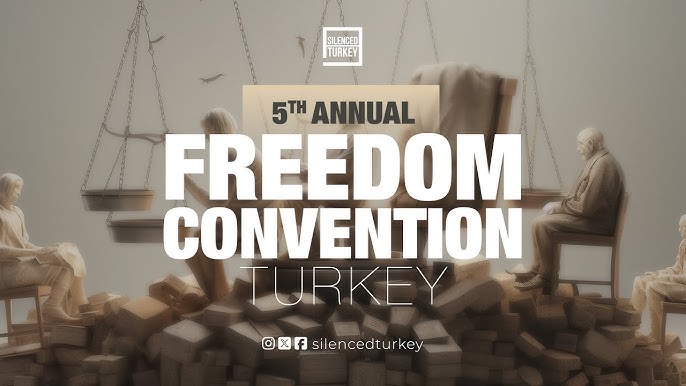Virtual panels organized by Advocates of Silenced Turkey (AST) on December 10 drew the world’s attention to the human rights crisis in Turkey, with testimony from victims and calls for international action against systemic oppression.
The Freedom Convention Turkey 2024, held on the occasion of Human Rights Day, brought together human rights advocates, policy experts, academics and survivors to highlight the consequences of authoritarianism in Turkey and explore strategies for justice and accountability. The event addressed critical issues such as the suppression of dissent, the collapse of democratic freedoms and the economic impact of weakened institutions.
The first panel focused on Turkey’s authoritarian policies and their impact at home and abroad. Speakers emphasized the government’s erosion of judicial independence, the suppression of political opposition and the discrepancy between Turkey’s global human rights rhetoric and its actions at home. The panelists also discussed the challenges facing Turkey’s divided opposition and the role of the international community in combating repression and supporting democratic reform.
The second panel explored the link between the decline in democratic freedoms and economic instability in Turkey. The panelists discussed how corruption and authoritarian policies drive poverty, exacerbate social marginalization and deepen the struggles of marginalized groups, especially those affected by political purges. These purges have led to mass dismissals, arrests and detentions that have left tens of thousands, including women and children, in dire straits.
People who have been directly affected by Turkish politics also had their say at the event.
Gülcan Diril, whose parents were forcibly disappeared, spoke about the ongoing trauma of her family’s situation and the lack of justice for the victims of enforced disappearance.
Her parents, Hurmüz Diril and Şimoni Diril were among the last remaining Chaldeans in southeastern Turkey and were victims of a pattern of violence and neglect faced by Christian minorities in the region. They disappeared from their village under mysterious circumstances in 2020, with Şimoni’s body only being found months later and no trace of the father Hurmüz Diril ever being found.
Tarık Toros, a well-known journalist and political commentator currently living in exile in the UK, described the collapse of press freedom and the important role of international solidarity in supporting independent media and restoring democratic values.
Toros was formerly the editor-in-chief of Bugün TV, which was seized by the Turkish government in 2015 and subsequently closed down. Toros co-founded MoonStar TV, a YouTube platform dedicated to providing independent journalism for Turkish-speaking audiences. Through his personal channel and other platforms, he analyzes political developments, governance and social issues in Turkey.
Vonya Womack, Executive Director of Rights United Support Union, highlighted the suffering of more than 80,000 political prisoners in Turkey, including children and women, who are held in harsh conditions.
Human rights expert Elodie Tranchez pointed to Turkey’s transnational repression tactics and called for greater use of United Nations mechanisms to hold the government to account.
AST spokesperson and program director Hafza Girdap stressed the importance of the testimonies and called on the international community to capitalize on the momentum generated by the event. “The testimonies shared during the Freedom Convention remind us of the strength of those resisting oppression. We must harness this momentum to support victims, hold perpetrators accountable and advocate for systemic change,” said Girdap.
Economist İlhan Doğuş and filmmaker Nejla Demirci pointed out the devastating social and economic consequences of Turkish authoritarianism and called for international cooperation to combat these injustices and promote democratic renewal.
Human Rights Day is observed by the international community every year on December 10. It commemorates the day in 1948 that the United Nations General Assembly adopted the Universal Declaration of Human Rights.
The milestone document proclaims the inalienable rights that everyone is entitled to as a human being — regardless of race, color, religion, sex, language, political or other opinion, national or social origin, property, birth or other status.
Recent reports and statistics regarding violations of human rights in Turkey reveal that the country is far from fulfilling its obligation to protect people’s rights, which are detailed in the declaration.
A government crackdown launched in the aftermath of a failed coup in July 2016 against the real and perceived members of the Gülen movement continues in various forms, with the group’s members being more likely to be subjected to mistreatment or abuse.
The Gülen movement is accused by the Turkish government of masterminding the failed coup and labeled as a terrorist organization.
The movement, inspired by the views of late Turkish-Islamic scholar Fethullah Gülen, denies the accusations.
Tens of thousands of people including the elderly, the ailing and pregnant women, were arrested in Turkey following the coup attempt on terrorism charges due to alleged links to the Gülen movement. Some have been released from prison after serving their sentence, but many are still behind bars.
Since the coup attempt, more than 705,172 people have been investigated on terrorism related charges due to their alleged links to the movement. There are at least 13,251 people in prison who are being held in pretrial detention or convicted of terrorism charges in Gülen-related trials.
In addition to the thousands who were jailed, scores of other Gülen movement followers had to flee Turkey to avoid the government crackdown.



